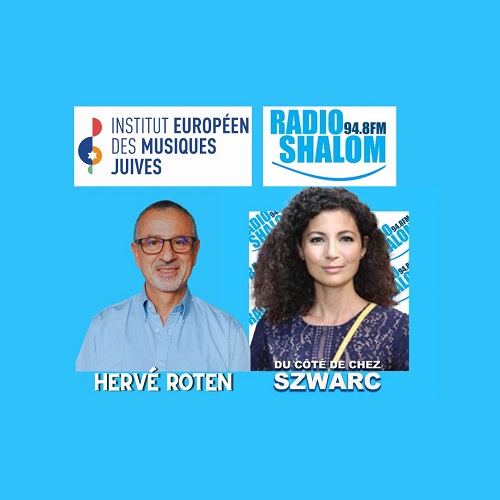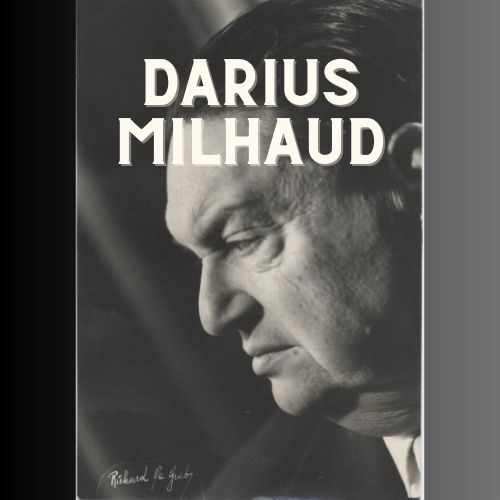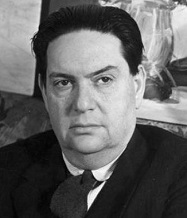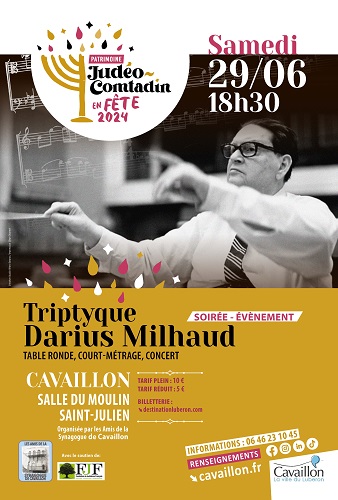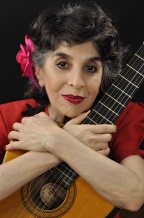
Author, composer, arranger, actress and singer, Sofia Jacinta Szlechtman was born on September 30, 1950 in Buenos Aires to a Russian-Polish Jewish family. Her maternal grandparents came to Buenos Aires from Khmelnits (Khmelnitsky) around 1920, escaping from pogroms. Her mother was born in Argentina in 1924. Her father was born in Lodz, Poland, in 1921 and arrived in Buenos Aires in 1950, after having traveled through some Latin American countries after the war.
“Yiddish was part of my daily life. First, in my father’s voice, who was singing for me the melodies that his mother was humming to him, in conversations in Yiddish and Spanish with my maternal grandparents, and then at the Yiddish school, where I studied grammar, syntax, literature…” […] At the Yitskhok Leybush Peretz school, part of the ICUF movement, led by the writer and poet Tsalbush Peretz, children were abble to sing the Argentine national anthem and the the national flag melodies in Yiddish adaptations, written by LERER Blitz.”[1]Excerpt from Jacinta’s emails to Hervé Roten, October 8, 2021 and January 18, 2023
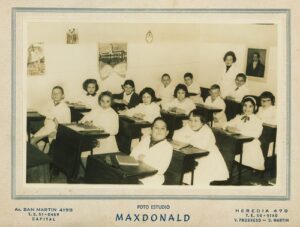
A successful student in elementary school and in Yiddish school, she was noticed by her music teachers and often sang solo on celebrations or during commemorations, such as the Warsaw Ghetto Uprising. At the age of six, she joined a choir and, at twelve, led a small vocal ensemble of Argentine and Yiddish music. But it was Atahualpa Yupanqui, singer of the humiliated peoples of Latin America, who marked Jacinta’s awakening to the instrument that would accompany her on stage: the guitar.
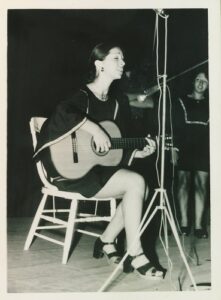
In 1977, she meets her future husband, of Spanish origin, in Buenos Aires and follows him to Paris. The following year, she performs at the Avignon Festival in the show Le Chant profond juif (The Deep Jewish Song) by the actress and radio and television producer Eve Griliquez. She performs Judeo-Spanish songs with the ensemble Kol Aviv, the Yiddish singer Talila and the actors Michel de Maulne and Jean-Paul Lahore. The first part of the show is devoted to Judeo-Spanish songs and poetry and Moroccan tales; the second to Yiddish poetry and songs.
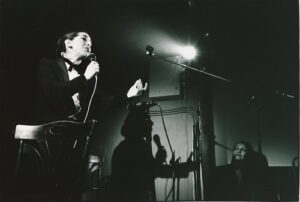
Between 1982 and 1988, she sings regularly at the Trottoirs de Buenos Aires, a mythical Parisian venue dedicated to Argentinean tango. Accompanying herself on the guitar or followed by a pianist, she interprets tango in a personal, tender style, covering Carlos Gardel, Homero Manzi and introducing her own compositions in Spanish, which often refer to her childhood, to her Russian Jewish grandparents, while mentioning the contribution of immigrants to Argentine tango.
Success being at the rendezvous, she registers in 1982 at Carrière her first 33 rpm record Tango mi corazón. Two years later, she produces a cassette, Du baroque espagnol au tango, and participates in a tribute to Osvaldo Pugliese, in his presence, at the Bataclan, in Paris.
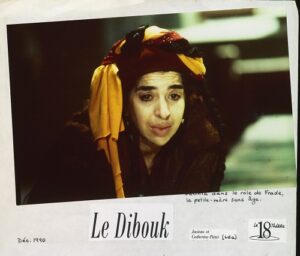
In addition, Jacinta performs in the Cinema in a movie by Ulrike Ottinger, Johanna d’Arc of Mongolia, with Delphine Seyrig (1989) and in the theater where she plays in particular in Le Dibbouk, directed by Bernard Djaoui in 1990, or in the review Mortadela by Alfredo Arias (Molière for the best musical show, 1992)
However, Jacinta does not forget her origins. She regularly sings in Yiddish, Judeo-Spanish and Spanish but does not hesitate to explore French songs and perform her own compositions [2]Jacinta has notably set to music two poems by one of her choristers, a friend, Catherine Franck, who died in 2022: Les ateliers de couture and Tissages d’Heun’chy. Between 1986 and 1999, she records two albums of Yiddish songs (Dos Lid fun goldenem Land, cassette, 1986; Autres chansons yiddish, Ocora Radio-France, Cassette and CD, 1992) and a CD of Judeo-Spanish songs (Morenica, Chant du Monde, distribution Harmonia Mundi, 1999). In 2016, the producer Patrick Campistron publishes the CD Ofrecer mi corazón, label Soupir. Jacinta performs titles like “Youkali”, “Poupée de Cire”, South American songs, such as “Te recuerdo Amanda”, “Amapola” and one of her compositions “Sos la noche” with the accordionist David Venitucci.
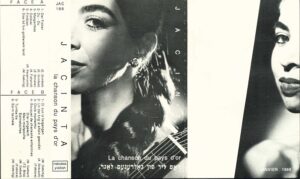
Eager to pass on her passion for singing, Jacinta has been directing the Jacintas Zingers choir since 2001, first with the Association for the Study and Dissemination of Yiddish Culture (AEDCY) and the Maison de la Culture Yiddish (MCY), then at the Cercle Bernard Lazare, and from 2021 at the Medem Center. Her choir members, of all ages, admire her qualities as a teacher and musician-arranger. But beyond this purely musical aspect, she notices that:
“For the elders, Yiddish (Judeo-Spanish for some as well) was the language of a hidden childhood, that of deported parents. And I found myself among these mortified souls singing this forbidden Yiddish to them, making them feel that it was more than a language, but a flavor, a way of life, a joy among so many sorrows…
Another chorister, whose parents were both taken, told me that she had tried to sing in Yiddish, in vain. Only with me did she feel that it was no longer a dead language but the language of the beloved dead, which she was able to rediscover in music, with other people around.
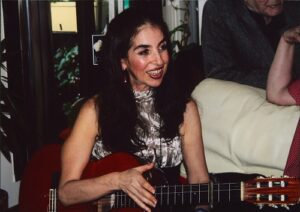
I did not have children, but my choristers, young and old, are “mayne kinder” [my children].”[3]Excerpt of an email from Jacinta to Hervé Roten dated October 8, 2021
Jacinta has been awarded many times for her entire career: Prix Korman [4]The Ydl Korman prize is awarded for all activities in favor of Yiddish culture in all fields, Art, Literature, Sculpture, Music, History, Shoah, etc. since 1986. in 2003, Prix de l’Académie Charles Cros for his CD of rhymes and rounds from Argentina in 2004, and Prix Cukierman [5]The Max Cukierman Prize was founded in 1982 by Roger and Henri Cukierman to perpetuate the memory of their father and his attachment to Yiddish culture in 2008.
Sources:
- Jacinta’s website
- Bible Tango
- Akadem : Chanter le yiddish de Buenos Aires à Paris
- IEMJ : Jacinta, entre chansons yiddish, judéo-espagnole et tango
Links:
- Watch the video Jacinta, between Yiddish songs, Judeo-Spanish and tango
- Listen to the playlist Jacinta, songs of life
- Browse Jacinta’s archives deposited at the EIJM
- Learn more about the Jacintas Zingers Choir
- Visit Jacinta’s You Tube channel
Sur un saule pleureur (Jacinta)
| 1 | Excerpt from Jacinta’s emails to Hervé Roten, October 8, 2021 and January 18, 2023 |
|---|---|
| 2 | Jacinta has notably set to music two poems by one of her choristers, a friend, Catherine Franck, who died in 2022: Les ateliers de couture and Tissages d’Heun’chy. |
| 3 | Excerpt of an email from Jacinta to Hervé Roten dated October 8, 2021 |
| 4 | The Ydl Korman prize is awarded for all activities in favor of Yiddish culture in all fields, Art, Literature, Sculpture, Music, History, Shoah, etc. since 1986. |
| 5 | The Max Cukierman Prize was founded in 1982 by Roger and Henri Cukierman to perpetuate the memory of their father and his attachment to Yiddish culture |
